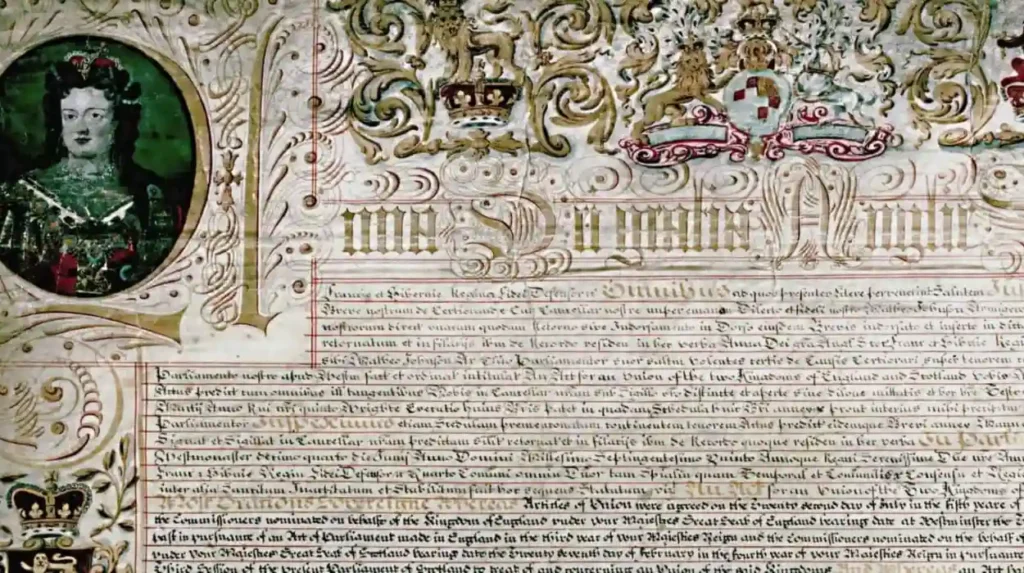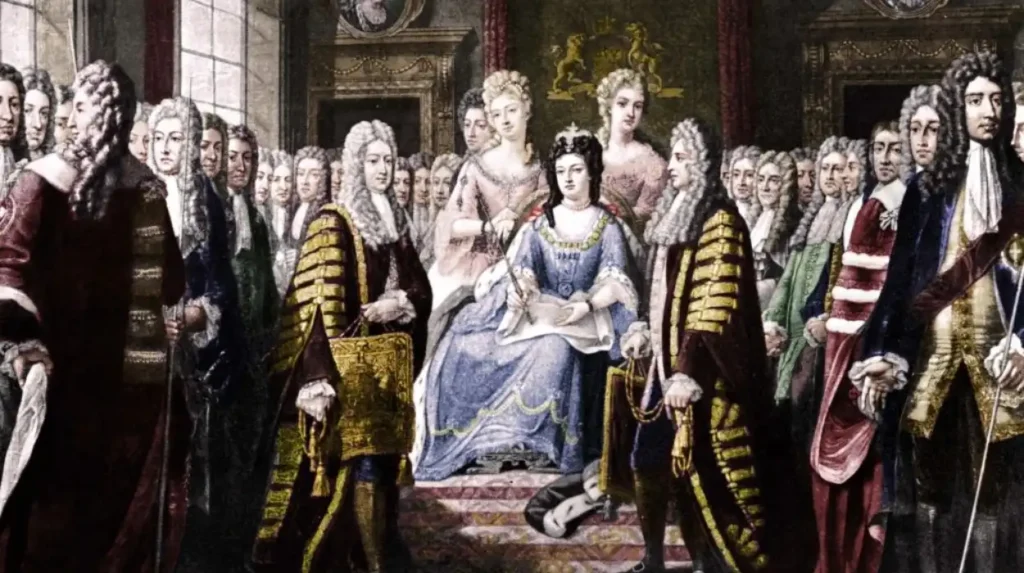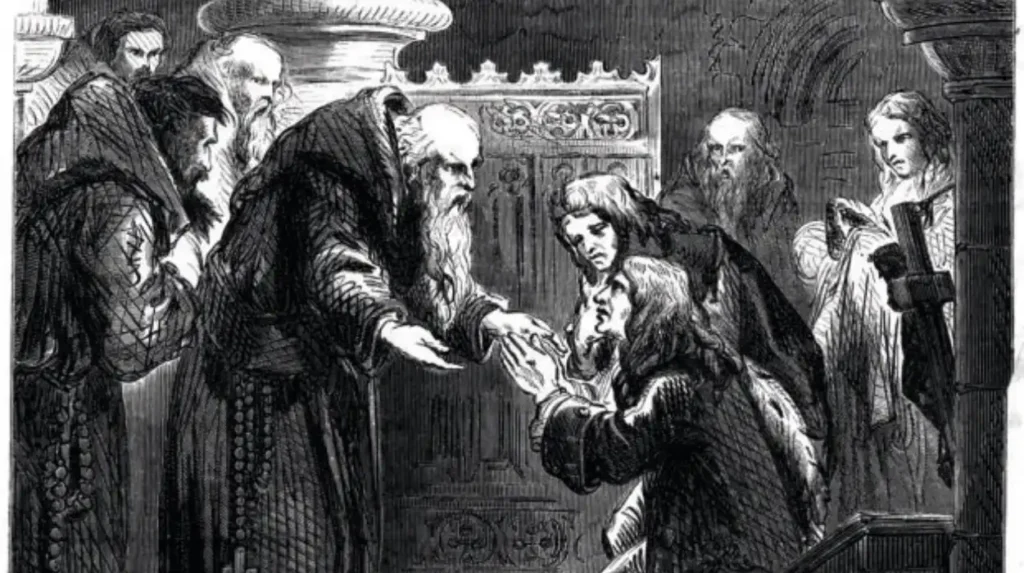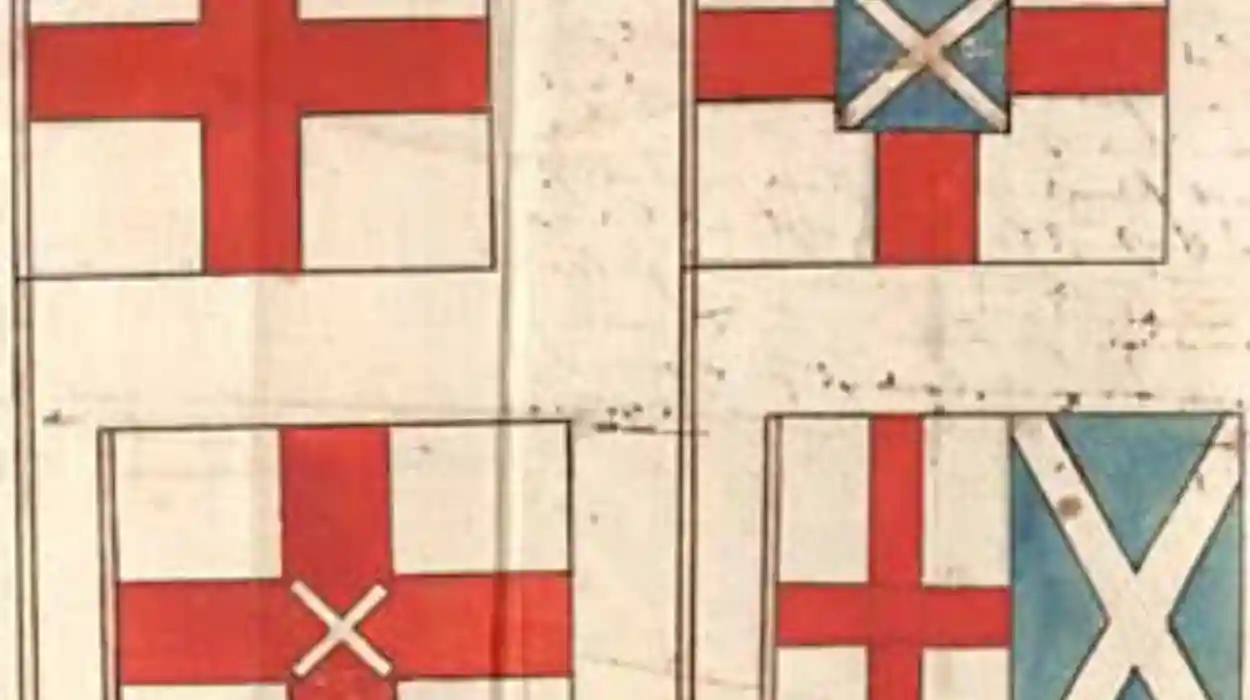The Act of Union 1707 is one of the most significant political documents in British history, uniting the Kingdom of England and the Kingdom of Scotland to form the Kingdom of Great Britain. While the Act of Union is significant legislation, it is not extraordinary or a single event in history. Rather, it is just one of many political, economic, and social phenomena and events that contextualize the understanding of how two neighboring nations with hundreds of years of conflict and rivalry could agree to unite into one geopolitical state.
1. Political Factors Contributing to the Union
Political factors were an important consideration when negotiating and finalizing the union. The English may have been particularly concerned by the prospect of Scottish independence and the particular threat of foreign alliances with other states, in particular, France, England’s long-standing rival. The War of the Spanish Succession had begun, with an escalation of tensions and the prospect of open conflict looming.
Further, in an independent Scotland, England assumed that it could be vulnerable to attacks and invasion if Scotland was free to administer its own foreign policy and Scotland’s military alignment could suddenly shift the balance of power.
Scotland was also directly implicated in international politics, with competing visions of independence, which some leaders advocated for, while others believed union would provide some stability and influence in a larger kingdom. The notion provided that governance together in a single parliament could prevent any future conflicts between the two sides.

2. Economic Pressures in Scotland
Economic hardship was one of the strongest incentives for the union for Scots. The late 17th century had seen Scotland have an economic downturn that included famine, poor harvests, and the collapse of the economy. The great disaster of the Darien Scheme, when Scotland attempted to establish a colony in Panama in the 1690s, left Scotland in great debt.
Financially, outcomes were devastatingly bad. Engaging the interests of wealthy Scottish merchants and landowners, the union would provide them with English access to colonial markets. The opportunity for economic recovery with trade privileges or some financial compensation made the option appealing to Scotland’s leadership cohort.
3. England’s Economic Interests
Scottish opportunity also caused some financial motives for England. England wanted to avoid a Scottish economic competitor with France or a European alliance. The union will have a single market so that England can monopolize Scottish trade and integrate Scotland into a growing empire. More interestingly for English interests, the United Kingdom would standardize taxation and customs, impacting trade. The union for England is of economic dominance, removing a commercial threat from the north.
4. Security Concerns and Foreign Relations
Security issues were also motivations behind the Act of Union. England was apprehensive that Scotland could become a launching point for enemies, especially France in the early 18th century, during war. Jacobite sympathizers who supported the claim of James II and VII were not only an English issue but also a trouble among pro-union Scottish leaders. Many Jacobites were fighting to restore the Stuart monarchy as well as were willing to work closely with French sympathizers in coalition with them. England was hoping that by uniting the two kingdoms, they could remove Scotland as an alternative invasion point and strengthen Britain’s political outlook among Europe.
5. Religious Consideration
In 18th-century Britain, religion was a sensitive topic, and it provided the union with an important role. England was Anglican, and Scotland was a Presbyterian country, and this was a source of political tensions between them. Also, as the Act of Union allowed Scotland to maintain its own church, the English leadership was pleased to not see political unity become an agenda of religious division. From Scotland’s perspective, the confidence that the Presbyterian Church of Scotland would be unaffected allowed their concerns of potential English religious influence to be less anxious and ultimately made the union easier to accept.
6. The Role of the Scottish Elite
The Scottish political community significantly aided in making the union successful. Many members of the Scottish Parliament were given incentives to pass union legislation or given positions in the new political arrangement. In what was called the “Equivalent,” these payments were meant to address Scotland’s share of England’s national debt as well as to compensate investors who lost money in the failed Darien Scheme.
Although some critics equated the “Equivalent” to bribery, it was an effective strategy in garnering the support of influential members of Scottish Parliament who could help orchestrate the legislation through Parliament. Their acceptance of the Union was a key element of its completion.

7. Public perception/response
The political and economic elites saw benefits of the union, as did some general members of the public, but the general population’s perception, informed by the Scottish public, was very much against the idea of the union. Many common Scots feared losing their identity, culture, and country. Protests and riots erupted in a number of towns, and documents opposing the union circulated in quite happy numbers. In England, public opinion was less intense, but people still wondered if unifying Scotland would be worth the cost. However, the decision lay with the political class, and public opinion was unable to halt the process.
8. Negotiations and the Treaty of Union
The process leading up to the Act of Union began with negotiations between commissions appointed by both parliaments in 1706. These negotiations produced the Treaty of Union, which outlined the terms of the agreement. In the treaty, the terms of the outcome contained the promise of a single parliament in Westminster, a single unified trade policy, and retention of certain Scottish institutions, including law and education. In return, Scotland gained access to the colonial markets of England and the Equivalent. Subsequently, the terms were ratified by the English and Scottish parliaments, and the Act of Union passed in 1707.
9. The Passing Act of Union
The Act of Union was passed by the English Parliament in January 1707 and by the Scottish Parliament shortly thereafter. On May 1, 1707, it came into effect, officially creating the Kingdom of Great Britain. The new union combined the political power of both into one government while each retained some aspects of their laws and religious tradition. The passing of the Act of Union was the result of years of political maneuvering, economic negotiations, and astute political calculation.
10. Immediate Aftermath of the Union
The immediate effects of the union were a mixed experience. From an economic perspective, Scotland benefited from access to English markets but not without its troubles. English merchants despised the competition represented by Scottish businesses, and many Scots hated losing their independence. Politically, the union bolstered Britain’s standing in Europe and the position of Britain fighting the War of the Spanish Succession. But anti-union sentiment persisted and continued as an aspect of British politics for decades and will remain.

Long-Term Significance to the Union
When we consider the long-term significance of the Union, the most important legacy that was established was the groundwork that allowed Britain to become a global power in the 18th and 19th centuries.
Being incorporated into the British state, problems that could lead to resentment diplomatically could be mitigated through a coherent foreign policy, which was possible now that there was a unified British army (engaged in simultaneous wars around the world) and shared economic growth through industrialization and foreign trade.
Despite the controversial means behind the union’s inception, it undoubtedly transformed the political landscape of the British Isles for more than three centuries, a legacy that continues saturating British politics to the present day in the contexts of empire and debates surrounding the potential for Scottish independence.


